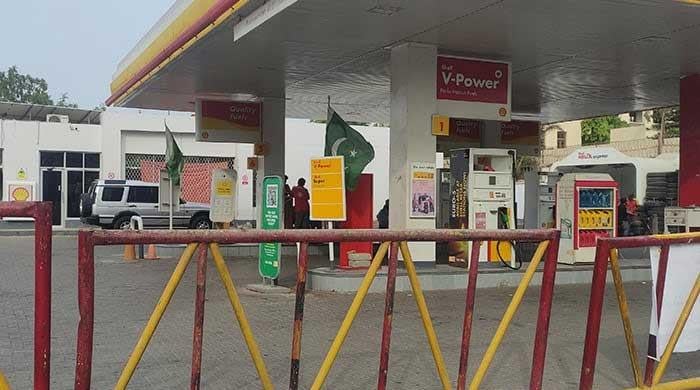Pakistan on track to secure new loan from IMF: FinMin Aurangzeb
“The fund has been very receptive in terms of agreeing to consider a larger, longer programme,” says Muhammad Aurangzeb
April 22, 2024

- Macroeconomic factors shifting in Pakistan’s favour: Aurangzeb.
- Says inflation on track to drop to single-digit level by end next year.
- Pakistan rupee has finally stabilised, finance minister claims.
With macroeconomic factors shifting in Pakistan’s favour, Finance Minister Muhammad Aurangzeb has said that Islamabad is on track to secure a new loan from the International Monetary Fund (IMF) — the Washington-based lender.
In an interview with The National, the finance czar said: “The fund has been very receptive in terms of agreeing to consider a larger, longer programme.”
Pakistan has made a formal request to the IMF for another bailout package in the range of $6 to $8 billion under the Extended Fund Facility (EFF) with the possibility of augmentation through climate financing.
However, the exact size and time-frame will only be determined after evolving consensus on the major contours of the next programme in May 2024.
Aurangzeb told the Abu Dhabi-based publication that the macroeconomic factors are shifting in its favour as it works to boost its lagging economy.
The rupee has finally stabilised, he said, adding that the inflation is on track to drop to single-digit levels by the end of next year.
He further said that the cash-strapped nation would need at least three years of support to carry out a reform agenda across several sectors including taxation and energy.
Last week, the global lender's Middle East and Central Asia director said the IMF was ready to support Pakistan and the package of reforms is now more important than the size of the new programme.
"I think what is important at this stage is to accelerate the reforms, double down on the structure of reforms in order to provide Pakistan with its full potential of growth," Jihad Azour told a press conference on the sidelines of the IMF 2024 Spring Meetings.
Last month, Pakistan and the IMF struck a staff-level agreement (SLA) for the completion of the second review and release of the third tranche of $1.1 billion under the Standby Arrangement (SBA) programme.
After striking the SLA, the IMF confirmed that Pakistani authorities expressed interest in a successor medium-term Fund-supported programme to permanently resolve Pakistan’s fiscal and external sustainability weaknesses, strengthening its economic recovery and laying the foundation for strong, sustainable and inclusive growth.
The IMF had highlighted four major areas for signing the upcoming medium-term bailout package for Pakistan’s struggling economy.
‘After Islamabad, Lahore and Karachi airports will also be privatised’
Earlier today, the finance minister revealed that after the Islamabad International Airport, two more airports — Jinnah International Airport in Karachi and Allama Iqbal International Airport in Lahore — would also be privatised.
Addressing an event in Dubai, the finance czar said that talks are underway with Turkish and the Europium firms regarding privitisation of the Islamabad airport.
“The Pakistan International Airlines (PIA) will be privatised by July [2024].”
According to media reports, the newly elected government led by Prime Minister Shehbaz Sharif is under immense the International Monetary Fund's (IMF) pressure to privatise loss-making public-sector entities. The privatisation of various public-sector companies is an integral part of the IMF’s conditions for a bailout package, suggests the report.
Finance Minister Aurangzeb said: “Economic initiatives are not related to any government but to the country.”
He announced that their effective measures to reduce the current account deficit were being fruits.
“Foreign exchange reserves will rise to $9-10 billion by June,” the finance minister hoped.
Referring to his recent talks with the officials of the World Bank, the federal minister said that the international lender was ready to support "Digital Pakistan" for 10 years.
Talking about the economic reforms, Aurangzeb said: “No amnesty scheme will be introduced now. People will have to pay taxes.”
The government was making international payments, adding that the “trust of global lenders has been restored”.











